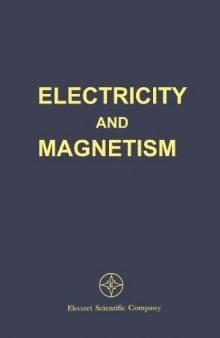 جزییات کتاب
جزییات کتاب
This textbook of electromagnetic theory, written for an advanced undergraduate course, is characterized by its pedagogical excellence and by an abundance of novel material, problems, and illustrative examples based on the author's original research and on his contributions to Maxwell's theory of electric and magnetic phenomena. Among the many unique and novel features of the book are: author's solutions of Maxwell's equations (now referred to in the scientific literature as the "Jefimenko's equations"), a comprehensive treatment of vector-analytical operations involving retarded field integrals, a detailed discussion of electric fields outside current-carrying conductors, spectacular line-of-force photographs of electric fields inside and outside current-carrying media, calculations of electric and magnetic fields from charge and current inhomogeneities, a remarkably simple derivation of Maxwell's stress integrals, the "thin shell" atomic model, Minkowski's equations for moving media, electromagnetic effects affecting space crafts moving through interplanetary or interstellar magnetic fields, a detailed analysis of Poynting's energy flux in and out a cylindrical conduit, the method of "equivalent currents," etc., etc. The presentation is clear, logical, thorough and thought-provoking. Employing the time-independent Maxwell's equations as the starting point, the theory is developed from the beginning on the basis of the Faraday-Maxwell concept of electric and magnetic fields. A generalization to the time-dependent Maxwell's equations is effortless and lucid. Vector analysis is introduced early in a self-contained chapter and is then used throughout the text as a standard mathematical tool. The exposition is purposeful and efficient. Careful distinction is made between the definitions, laws and consequences. The range of validity and the limitations of applicability of all the electric and magnetic laws are clearly stated. The book is written for the student and is designed to encourage a creative application of electromagnetic theory. For this purpose numerous carefully selected illustrative examples have been incorporated in the text and an excellent collection of problems has been supplied with each chapter. The format of the book is designed for easy readability. The book is set in the famous British Baskerville typeface, which is one of the most readable typefaces in existence. The format is further enhanced by numerous meticulously executed air-brush drawings. The book is printed on acid-free Fortune Matte paper and is bound in high grade "artificial leather" cloth. The book contains 598 pages of main text in 16 chapters, 544 problems, 243 illustrative examples, 249 figures, 12 plates of lines-of-force photographs and 10 tables.



 دانلود کتاب
دانلود کتاب

 جزییات کتاب
جزییات کتاب





 این کتاب رو مطالعه کردید؟ نظر شما چیست؟
این کتاب رو مطالعه کردید؟ نظر شما چیست؟
